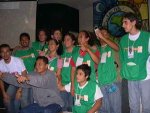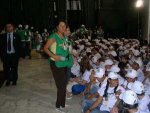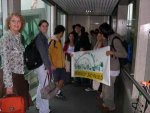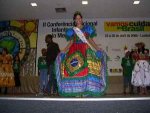
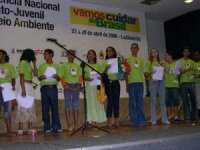
Inicio
Publicado el 15 de junio de 2006
Traducciones disponibles en:
Português do Brasil (original) .
Español .
français .
فارسى .
ελληνικά .
Charter of Responsibilities “LET’S TAKE CARE OF BRAZIL”
Temas fuertes asociados:
Medio ambiente y responsabilidad .
Temas generales asociados:
Niños .
Educación .
Medio ambiente .
Educación medioambiental .
Jóvenes .
Final document of the Second National Conference of Children and Adolescents for the Environment (II CNIJMA,) drawn up by about 600 young people aged 11 to 14, representing Brazilian schools.
[Here in English. You can also download below the document in six languages]
We are young people from all over Brazil, involved in the Second National Conference of Children and Adolescents for the Environment. We want to build a just, happy and sustainable society. We are assuming responsibilities and actions that are full of dreams and needs. This Charter expresses the collective ideas of twelve thousand schools and communities from all over the country, who held their conferences in 2005. It represents the wishes of four million people.
It is a means of expressing our wishes and our attachment to life and its diversity. We understand that without this diversity the world would be without colour. We have found ways to work on complex and urgent global issues: Climate Change, Biodiversity, Food Safety and Ethnic and Racial Diversity. We want to raise awareness and mobilise people to face together the great social and environmental challenges that confront our generation.
In order to take care of Brazil, we need everyone’s contribution. We are in the process of strengthening student action and we are uniting with the COM-VIDAS – committees on the environment and quality of life at school, with young people’s environmental groups and with many other groups. We share responsibility with governments, companies, the media, NGOs, social and cultural movements, as well as with our own communities.
We are therefore assuming the following responsibilities:
1. The distribution of information and the broadening of knowledge through environmental education.
We will organise exchange groups to carry out symposia, seminars, campaigns, research and cultural presentations by young people to young people and by young people to adults. We will protect and value the place where we live and its cultures by the creation and use of different means of communication that are both open and creative.
2. The protection and development of biodiversity.
We have to preserve the natural vegetation of our ecosystem, by protecting the existing flora and regenerating the damaged areas in the countryside and the cities. It is important to reforest certain areas, to develop seed nurseries and to create intermediary cultures in order to cultivate native plants.
3. The transformation of cities, communities and schools into healthy environmental spaces.
We will combine our efforts with the whole school community in order to plant fruit trees in schools, villages and neighbourhoods and we will create vegetable gardens, orchards, squares, parks and gardens.
4. The reduction of the production of waste by practicing the five Rs: rethink, refuse, reduce, re-use and recycle.
We will rethink production methods and real consumption needs. We will re-use disposable products and have a preference for recyclable products. We will practice the sorting of waste in order to support its selective collection and the creation of fertilizer from organic matter. We will support collectives and demand the support of town councils.
5. The reduction of polluting gases that cause global warming.
We will practice hitchhiking to show solidarity and promote the use of collective transport and bicycles. We will urge the use of alternative energies, such as solar or wind energy.
6. The prevention of deforestation and fires.
We will carry out research and speak with farmers and landowners about sustainable practices, and more precisely on the treatment and use of soils and forests (the influence of which on the reduction of global warming is significant). We will organise the distribution of indigenous seed, publicity campaigns, fora and ecological marches.
7. The respect, understanding and recognition of cultural diversity.
We will promote events that bring together cultures and ethnic groups. We will guarantee the visibility and practice of standards that integrate the history of other cultures in school programmes, such as for example the Afro-Brazilian culture. We will broadcast the value of different cultures through the media.
8. The development of the production and consumption of natural and organic food.
We have to: change our dietary habits in order to give greater importance to healthy foods; raise farmers’ awareness of growing practices using organic fertilizers and natural insecticides; and say no to the cultivation and consumption of genetically modified products.
9. The re-education of the people with regard to food and their habits.
We will develop food safety projects, such as for example balanced school menus, the safeguarding and sharing of traditional knowledge, recipes containing healthy foods, school vegetable gardens... We invite you to take care of Brazil. Luziânia (Goiás), 26 April 2006.
(text translated into English by Emmanuel Mendonca, original in Portuguese)
More information here (Website in Portuguese)

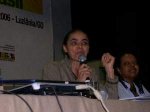
Speech by the Minister for the Environment, Mrs Marina Silva
